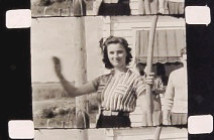What do I need to have/do to host a Home Movie Day event in my area?
Aside from a venue, you’ll need certain supplies and equipment for the classic Home Movie Day format of film inspection and projection. But even if you have no venue or equipment, don’t let that stop you – starting in 2020 we saw a proliferation of curated programs, info sessions about home movie preservation, workshops, and conversations that are great models for either in-person or virtual events. Check out our how-to guide for hosting virtual events, available in PDF format along with a wealth of other planning guides and templates on our HMD Documents page. It also helps to have support from local archives, libraries, film societies, or other organizations—they can help you reach a local audience that already has an interest in regional history, filmmaking, or preservation.
Sure it’s risky to project shrunken, damaged, and dirty film. That’s why we urge our local venues to inspect and prep every piece of film before it’s projected. We feel that the risk of damage to films in good condition, when projected with clean, well-maintained equipment, is far smaller than the risk that those films will be discarded or destroyed through neglect if they’re never seen.
Any big room where you can pull down the shades and put up a screen will do, so think creatively and keep your eyes peeled. Libraries, community centers, colleges, bookstores, museums, independent movie theaters, and even bars have hosted Home Movie Day events in the past. Don’t be afraid to ask to speak to managers or owners of places where you think it’d be nice to have your event; Home Movie Day is a community-oriented activity that can help bring in local business, so there’s a benefit to them, too!
It is possible to do Home Movie Day Bingo online?
Yes! Let us introduce you to Home Movie Day Bingo – virtual edition! Skip Elsheimer created a simple and free online version of this classic Home Movie Day activity: https://bingobaker.com/play/1120230a2704338d.
You can share the link with attendees at many of the types of events listed above, simply by including it in the event description or sharing it in the chat function, or both.
Home Movie Day Bingo gets people involved in watching for details in the films. Each player gets a unique Bingo card. On each card are 5 columns of items – things or activities that you might see in a home movie (e.g. “mustache”; “sledding”; “fishing rod”). Whenever a player sees an item on their card in the home movie they are watching, they mark it by clicking on that square. When someone gets five in a row across, down, or diagonally, they type out “Bingo!” in the chat. Then they must name the items they saw in the films. Get creative about how to award virtual prizes to winners!
More information and a PDF version of cards if you prefer to print them out: https://www.centerforhomemovies.org/wp-content/uploads/HMD-Bingo.pdf
Where can I find the HMD 2024 Online trailers and promotional images?
~ To come! ~ in the meantime, feel free to use any logos and images from years past on our promotional images page.
A full trailer (runtime 1:30) is available in two versions:
And as a 15 second logo animation:
I am interested in creating a pre-recorded program of home movies but do not know where or how to post this online. Can CHM help me?
Yes! CHM is committed to assisting archives in hosting videos through our Vimeo platform. If you are interested in this option, please email info@centerforhomemovies.org in the early stages of your planning so we can communicate the parameters of what we can offer. Any digital files should be submitted at least a month prior to the event with the video specifications outlined below.
What file size & details work best for uploading to Vimeo/YouTube/Facebook, etc. for streaming?
We suggest working with files with the following specs, which are most compatible for web and media players:
- mp4 files with an h.264 codec, which is about the most compatible format for the web and media players
- 1920 x1080 with a 2 ch stereo mix (if your files have audio)
- for frame rates, avoid non-traditional speeds and use one of the following – 23.98, 24, 25, 29,98 or 30
- bit rate in the 5000-8000 kbps range
I have technical questions beyond what is covered here, or I’m just not sure where to start. Can you help?
Please email info@centerforhomemovies.org with your questions, or better yet, post them to the Home Movie Day Google Group (email us to be added!), where you can connect to a community of fellow HMD hosts for support.

